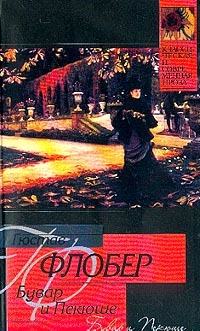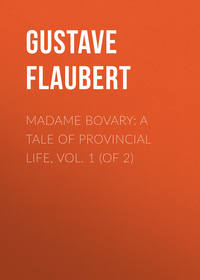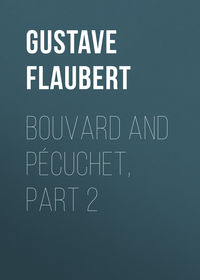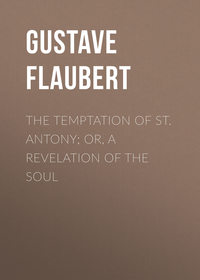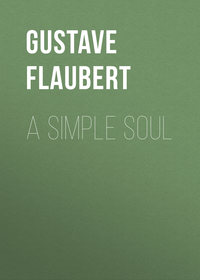
Полная версия
Madame Bovary
The latter did not at all dislike his company. He had knocked about the world, he talked about Berlin, Vienna, and Strasbourg, of his soldier times, of the mistresses he had had, the grand luncheons of which he had partaken; then he was amiable, and sometimes even, either on the stairs, or in the garden, would seize hold of her waist, crying, “Charles, look out for yourself.”
Then Madame Bovary, senior, became alarmed for her son’s happiness, and fearing that her husband might in the long-run have an immoral influence upon the ideas of the young woman, took care to hurry their departure. Perhaps she had more serious reasons for uneasiness. Monsieur Bovary was not the man to respect anything.
One day Emma was suddenly seized with the desire to see her little girl, who had been put to nurse with the carpenter’s wife, and, without looking at the calendar to see whether the six weeks of the Virgin were yet passed, she set out for the Rolets’ house, situated at the extreme end of the village, between the highroad and the fields.
It was midday, the shutters of the houses were closed and the slate roofs that glittered beneath the fierce light of the blue sky seemed to strike sparks from the crest of the gables. A heavy wind was blowing; Emma felt weak as she walked; the stones of the pavement hurt her; she was doubtful whether she would not go home again, or go in somewhere to rest.
At this moment Monsieur Léon came out from a neighbouring door with a bundle of papers under his arm. He came to greet her, and stood in the shade in front of the Lheureux’s shop under the projecting grey awning.
Madame Bovary said she was going to see her baby, but that she was beginning to grow tired.
“If—” said Léon, not daring to go on.
“Have you any business to attend to?” she asked.
And on the clerk’s answer, she begged him to accompany her. That same evening this was known in Yonville, and Madame Tuvache, the mayor’s wife, declared in the presence of her servant that “Madame Bovary was compromising herself.”
To get to the nurse’s it was necessary to turn to the left on leaving the street, as if making for the cemetery, and to follow between little houses and yards a small path bordered with privet hedges. They were in bloom, and so were the speedwells, eglantines, thistles, and the sweetbriar that sprang up from the thickets. Through openings in the hedges one could see into the huts, some pigs on a dung-heap, or tethered cows rubbing their horns against the trunk of trees. The two, side by side walked slowly, she leaning upon him, and he restraining his pace, which he regulated by hers; in front of them a swarm of midges fluttered, buzzing in the warm air.
They recognized the house by an old walnut-tree which shaded it. Low and covered with brown tiles, there hung outside it, beneath the dormer-window of the garret, a string of onions. Faggots upright against a thorn fence surrounded a bed of lettuce, a few square feet of lavender, and sweet peas strung on sticks. Dirty water was running here and there on the grass, and all round were several indefinite rags, knitted stockings, a red calico jacket, and a large sheet of coarse linen spread over the hedge. At the noise of the gate the nurse appeared with a baby she was suckling on one arm. With her other hand she was pulling along a poor puny little fellow, his face covered with scrofula, the son of a Rouen hosier, whom his parents, too taken up with their business, left in the country.
“Go in,” she said; “your little one is there asleep.”
The room on the ground-floor, the only one in the dwelling, had at its farther end, against the wall, a large bed without curtains, while a kneading-trough took up the side by the window, one pane of which was mended with a piece of blue paper. In the corner behind the door, shining hob-nailed shoes stood in a row under the slab of the washstand, near a bottle of oil with a feather stuck in its mouth; a Matthieu Laensberg lay on the dusty mantelpiece amid gunflints, candle-ends, and bits of amadou. Finally, the last luxury in the apartment was a “Fame” blowing her trumpets, a picture cut out, no doubt, from some perfumer’s prospectus and nailed to the wall with six wooden shoe-pegs.
Конец ознакомительного фрагмента.
Текст предоставлен ООО «ЛитРес».
Прочитайте эту книгу целиком, купив полную легальную версию на ЛитРес.
Безопасно оплатить книгу можно банковской картой Visa, MasterCard, Maestro, со счета мобильного телефона, с платежного терминала, в салоне МТС или Связной, через PayPal, WebMoney, Яндекс.Деньги, QIWI Кошелек, бонусными картами или другим удобным Вам способом.


